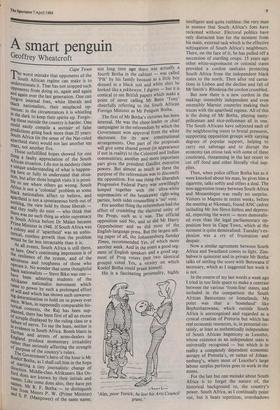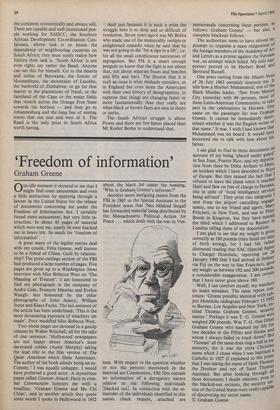A smart penguin
Geoffrey Wheatcroft
Cape Town Cape Town The worst mistake that opponents of the South African regime can make is to underestimate it. That has not stopped such opponents from doing so, again and again and again over the last generation. One can forgive internal foes, white liberals and black nationalists, their misplaced op- timism: in the circumstances it is whistling in the dark to keep their spirits up. Forgiv- ing those outside the country is harder. One Could easily compile a sottisier of false Predictions going back more than 25 years: South Africa (in the sense of the Nat-ruled apartheid state) would not last another ten Years, not another five.
Those unfulfilled hopes showed for one
thing a faulty appreciation of the South African situation. I do not in modesty claim a. unique understanding of what is happen- ing here or fully to understand that situa- tion, but after three longish visits it is possi- ble to see where others go wrong. South Africa is not a 'colonial' problem as some black nationalists affect to believe, and apartheid is not a spontaneous birth out of nothing, the view held by those liberals and they really do exist — who think that there was no such thing as white supremacy
South Africa before Dr Malan became Prime Minister in 1948. If South Africa was a colony and if 'apartheid' was an unhis- torical, rootless growth then the problem Would be far less intractable than it is. At all events, South Africa is still there,
or here. One's continuing impression is of the resilience of the system, and of the adroitness and toughness of those who black it. No wonder that some thoughtful have nationalists — Steve Biko was one - nave been admiring students of the Afrikaner nationalist movement which came to Power by such a prolonged effort Of will and which has shown such unwaver- ing determination to hold on to power ever since. When, in supposedly comparable his- torical contexts, the Raj has been sup- Planted, there has been first of all an excess
o_ i of displayed by the ruling class or a
!allure of nerve. To say the least, neither is In evidence in South Africa. Bomb blasts in ?.urban and arrests of arms-dealers in England produce momentary irritability rather than seriously affecting the strength of Purpose of the country's rulers. b The Government's hero of the hour is Mr relof Botha, as I shall call him in the hope U. starting a tiny journalistic d change of irection. Middle-class Afrikaners like Ox- ford dons are known by their initials and names. Like some dons also, they have pet names. Mr R. F. Botha — to distinguish anint, from Messrs P. W. (Prime Minister) S. P. (Manpower) of the same name;
not long time ago there was actually a fourth Botha in the cabinet — was called 'Pik' by his family because as a little boy
dressed in a black suit and white shirt he looked like a pikkewyn. I digress — but it is
comical to see British papers which make a point of never calling Mr Benn 'Tony' cheerfully referring to the South African Foreign Minister as Mr Penguin Botha.
The first of Mr Botha's victories has been internal. He was the cheer-leader or chief campaigner in the referendum by which the Government won approval from the white electorate for its new constitutional arrangements. One part of the proposals will give some shared power (in appearance if not in reality) to the Coloured and Indian communities; another and more important
part gives the president Gaullist executive powers. But almost as much as these the
purpose of the referendum was to discomfit the opposition. For one thing the liberalish Progressive Federal Party was unwillingly lumped together with the ultra-white supremacists of the breakaway right-wing parties, both sides counselling a `no' vote. For another thing the referendum had the effect of crumbling the electoral unity of
the Progs, such as it was. The official opposition said No, and so did Mr Harry Oppenheimer and so did most of the English-language press. But the largest sell- ing paper of all, the Johannesburg Sunday Times, recommended Yes, of which more another week. And in the event a good seg- ment of English speakers and a good seg- ment of Prog voters (not two identical groups) voted Yes, a victory on which Roelof Botha could preen himself.
His is a fascinating personality, highly 'Alas, poor Yorick, he lost his Arts Council grant.' intelligent and quite ruthless: the very man in essence that South Africa's foes have reckoned without. Electoral politics have only distracted him for the moment from his main, external task which is the effective subjugation of South Africa's neighbours. There, on the face of it, he has pulled off a succession of startling coups. 15 years ago other white-supremacist or colonial states provided a cordon sanitaire protecting South Africa from the independent black states to the north. Then after red carna- tions in Lisbon and the decline and fall of Mr Smith's Rhodesia the cordon crumbled.
But now there is a new cordon in the making: ostensibly independent and even ostensibly Marxist countries making their truces with the apartheid regime. All of this is the doing of Mr Botha, playing nasty- policeman and nice-policeman all in one. The South Africans have subjected each of the neighbouring states to brutal pressures, supporting opposition groups with varying degrees of popular support, helping to carry out sabotage and to disrupt the economy (an otiose task with some of these countries), threatening in the last resort to cut off food and other literally vital sup- plies.
Then, when police officer Botha has as it were knocked about his man, he gives him a cigarette, talks softly and offers a deal. The non-aggression treaty between South Africa and Mozambique was really no surprise. Visitors to Maputo in recent weeks, before the meeting at Nkomati, found ANC cadres including Mr Joe Slovo listless and depress- ed, expecting the worst — more demoralis- ed even than the legal parliamentary op- position here in Cape Town, which at the moment is quite demoralised. Tuesday's ex- plosion was a cry of frustration and despair.
Now a similar agreement between South Africa and Swaziland comes to tight. Zim- babwe is quiescent and in private Mr Botha ' talks of settling the score with Botswana if necessary, which as I suggested last week it is not.
In the course of my last words a week ago I tried in too little space to make a contrast between the various 'front-line' states, and included in the comparison the South African Bantustans or homelands. My point was that a 'homeland' like Bophuthatswana, which outside South Africa is unrecognised and regarded as a cynical creation of Pretoria but which has real economic resources, is, in potential cer- tainly, at least as authentically independent of South African hegemony as Lesotho, whose existence as an independent state is universally recognised — but which is in reality a completely dependent economic satrapy of Pretoria's, or rather of Johan- nesburg's, where most of Lesotho's large labour surplus perforce goes to work in the mines.
For the last but one mistake about South Africa is to forget the nature of, the historical background to, the country's power. South Africa, as I continually point out, but it bears repetition, overshadows the continent economically and always will. There are capable and well-intentioned peo- ple working for SADCC, the Southern African Development Co-ordination Con- ference, whose task is to lessen the dependence of neighbouring countries on South Africa; they must surely realise how forlorn their task is. 'South Africa' is not even right; say rather the Rand. Anyone can see this for himself. Go to the deserts and deltas of Botswana, the forests of Mozambique, the mountains of Lesotho, the bushveld of Zimbabwe; or go for that matter to the plantations of Natal, or the farmland of the Cape or the maize fields that stretch across the Orange Free State towards the horizon — and then go to Johannesburg and the long line of mining towns that run east and west of it. The Rand is the only prize in South Africa worth having.
And just because it is such a prize the struggle here is so deep and so difficult of resolution. Seven years ago it was Mr Botha who made one of the memorably verligte or enlightened remarks when he said that he was not going to die 'for a sign in a lift', i.e. for all the small conspicuous nastinesses of segregation. But Pik is a smart enough penguin to know that the fight is not about that, not about separate buses and benches and lifts and bars. The illusion that it is such an issue is what misleads outsiders, us in England but even more the Americans with their own history of desegregation, to suppose that things are changing faster or more fundamentally than they really are when black or brown faces are seen in shops or parks.
The South African struggle is about Power and there are few better placed than Mr Roelof Botha to understand that.











































 Previous page
Previous page